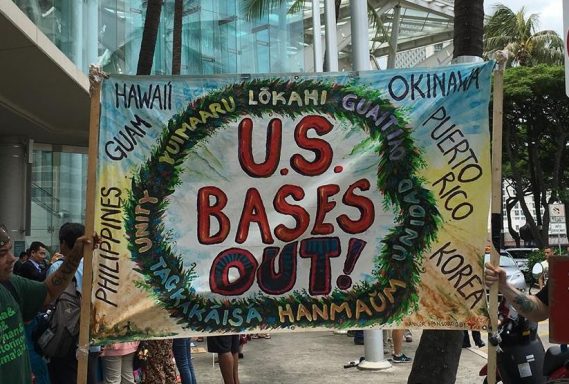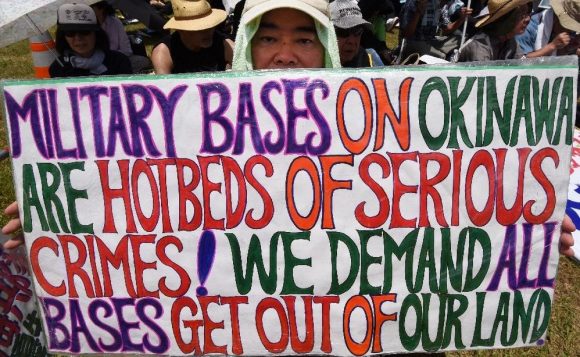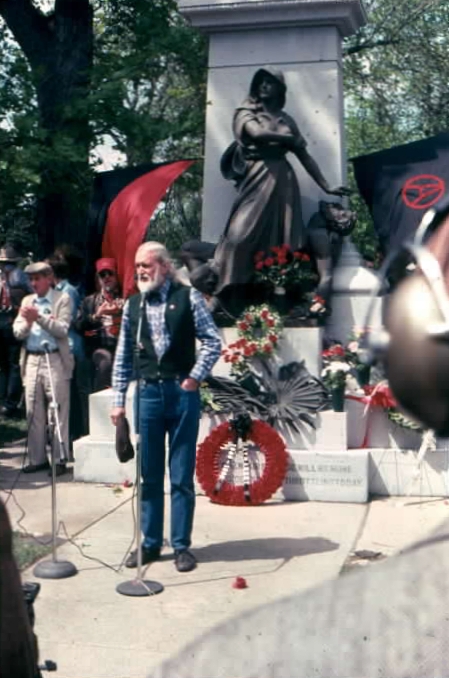NationofChange
January 17, 2018
No foreign bases: Challenging the footprint of US empire
The United States cannot be a moral or ethical country until it faces up to the realities of U.S. empire and the destruction it causes around the world.
Kevin Zeeze and Margaret Flowers / Op-Ed
The United States cannot be a moral or ethical country until it faces up to the realities of U.S. empire and the destruction it causes around the world. The U.S. undermines governments (including democracies), kills millions of people, causes mass migrations of people fleeing their homes, communities and countries and produces vast environmental damage.
“U.S. foreign military bases are the principal instruments of imperial global domination and environmental damage through wars of aggression and occupation, and that the closure of U.S. foreign military bases is one of the first necessary steps toward a just, peaceful and sustainable world.”
US foreign military bases as of 2015. Image Credit: BaseNation.us
Responsibility to end global empire of bases
Ajamu Baraka of the Black Alliance for Peace and the vice presidential candidate for the Green Party in 2016 opened the conference, describing the responsibility of the people of the United States (USians) to protect the world from U.S. aggression. He argued:
“The only logical, principled and strategic response to this question is citizens of the empire must reject their imperial privileges and join in opposing ruling elites exploiting labor and plundering the Earth. To do that, however, requires breaking with the intoxicating allure of cross-class, bi-partisan ‘white identity politics.’”
This reality conflicts with one of the excuses the U.S. uses to engage in war — so-called ‘humanitarian wars’, which are based on the dubious legal claim that the US has a “responsibility to protect.” The United States is viewed as “the greatest threat to peace in the world today” by people around the world. Thus, “USians” need to organize to protect the world from the United States.
“If present trends continue, four sorrows, it seems to me, are certain to be visited on the United States. Their cumulative impact guarantees that the United States will cease to bear any resemblance to the country once outlined in our Constitution. First, there will be a state of perpetual war, leading to more terrorism against Americans wherever they may be and a growing reliance on weapons of mass destruction among smaller nations as they try to ward off the imperial juggernaut. Second, there will be a loss of democracy and constitutional rights as the presidency fully eclipses Congress and is itself transformed from an “executive branch” of government into something more like a Pentagonized presidency. Third, an already well-shredded principle of truthfulness will increasingly be replaced by a system of propaganda, disinformation, and glorification of war, power, and the military legions. Lastly, there will be bankruptcy, as we pour our economic resources into ever more grandiose military projects and shortchange the education, health, and safety of our fellow citizens.”
The footprint of U.S. empire are what Chalmers Johnson called an “empire of bases.” David Vine, the author of Base Nation,put U.S. empire in context by describing 800 U.S. bases in 80 countries and U.S. military personnel in more than 170 countries. Bases range from so-called Lily Pad Bases of hundreds of troops to town-sized bases of tens of thousands of troops and their families. He noted many bases have schools and they do not need to worry about heating or air conditioning, unlike schools in Baltimore where parents bought space heaters to keep children warm and where schools were closed due to lack of heat.
The contrast between Baltimore schools and military base schools is one example of many of the heavy price “USians” pay for the military. Vine reported that $150 billion is spent annually to keep U.S. troops on bases abroad and that even a Lily Pad base could cost $1 billion. More is spent on foreign military bases than on any agency of the federal government, other than the Pentagon and Veterans Administration.
The Pentagon is not transparent about the number of US foreign bases it manages or their cost. They usually publish a Base Structure Report but have not done so in several years. The Pentagon only reports 701 bases, but researchers have found many, even significant bases, not included in their list of bases.
“95% of all foreign military bases in the world are U.S. bases. In addition, [there are] 19 Naval air carriers (and 15 more planned), each as part of a Carrier Strike Group, composed of roughly 7,500 personnel, and a carrier air wing of 65 to 70 aircraft — each of which can be considered a floating military base.”
The military footprint of the United States shows it is the largest empire in world history. In our interview with historian Alfred McCoy, author of “In The Shadows of the American Century,” he describes how some of the key characteristics of U.S. empire are secrecy and covert actions. This are some of the reasons why it is rare to ever hear U.S. empire discussed in the corporate media or by politicians. McCoy told us this was true for some other empires too, and that it is often not until the empire begins to falter that their existence becomes part of the political dialogue.

Strategies for closing U.S. foreign military bases
David Vine described an unprecedented opportunity to close bases abroad, to do so we need to build a bigger movement. We also need to elevate the national dialogue about U.S. Empire and develop a national consensus to end it.
Vine pointed to Donald Trump’s campaign rhetoric about pulling back from U.S. involvement abroad and focusing on the necessities at home as indicative of the mood of the country. In fact, a recent survey found that “78 percent of Democrats, 64.5 percent of Republicans, and 68.8 percent of independents supported restraining military action overseas.”
McCoy argued that after the globalization of President Barack Obama, which included the Asian Pivot and efforts to pass major trade agreements, in particular the Trans Pacific Partnership (TPP) and the Transatlantic Trade and Investment Partnership (TTIP), created a backlash desire to focus on “America First.” Both trade agreements, the TPP and TTIP, failed as a result of a political shift in the country, in part created by grassroots movements.
McCoy describes Obama as one of three “Grandmasters of the Great Game” (the other two being Zbigniew Brzezinski, President Carter’s National Security Adviser, and Elihu Root, former Secretary of War and Secretary of State at the beginning of the 20th Century) who excelled in being strategic on behalf of U.S. empire. In addition to trade agreements and the Asian Pivot, Obama built on the intelligence apparatus of the George W. Bush era. Even though Obama was a “grandmaster,” he did not slow the weakening of U.S. empire. McCoy sees the inability to account for the unpredictable complexities of U.S. and global political developments as a common weakness of empire strategists.
The conference was divided into regions of the world (with the exception of one session on the impact of military bases on the environment and health). There will be reports and videos published on each section of the conference on the No Foreign Bases webpage. One common denominator around the world is opposition to U.S. military bases. According to the Unity Statement of the coalition:
“Many individual national coalitions — for example, Okinawa, Italy, Jeju Island Korea, Diego Garcia, Cyprus, Greece, and Germany — are demanding closure of bases on their territory. The base that the U.S. has illegally occupied the longest, for over a century, is Guantánamo Bay, whose existence constitutes an imposition of the empire and a violation of International Law. Since 1959 the government and people of Cuba have demanded that the government of the U.S. return the Guantánamo territory to Cuba.”
One important strategy for success is for U.S. activists to work in cooperation with people around the world who want U.S. military bases to be closed and for the U.S. military to leave their country. Attendees at the conference had traveled to South Korea, Okinawa and other places to protest in solidarity with U.S. activists.
Another strategy that many in the conference urged was the need for education about U.S. imperialism and to tie U.S. militarism abroad with militarized police at home. Similarly, the reality of the U.S. military focusing on black and brown countries abroad highlights a white supremacy philosophy that infects foreign policy and domestic policy. Members of the No U.S. Foreign Bases coalition also engage in domestic efforts for racial and environmental justice.
“The Pentagon’s impact on the river on whose bank it sits is not simply the diffuse impact of global warming and rising oceans contributed to by the U.S. military’s massive oil consumption. The U.S. military also directly poisons the Potomac River in more ways than almost anyone would imagine.”

Next steps
The conference attendees decided on some next steps. A national day of action against foreign military bases is being planned for February 23, the anniversary of the U.S. seizing Guantanamo Bay, Cuba through a “perpetual lease” that began in 1903. Activists are encouraged to plan local actions. If you plan an event, contact info@popularresistance.org and we’ll post it on the events page. The demands will include closing the base and prison in Guantanamo, returning the land to Cuba and ending the U.S. blockade.
The conference also decided to hold a conference outside of the United States in one of the countries where the U.S. has a foreign military base within the next year. People from some countries were not allowed to attend the inaugural conference this weekend.
And, the coordinating committee will reach out to other peace and justice groups to select a date and place for a national mass action against U.S. wars. This will be organized as quickly as possible because the threat of more wars is high.
This is a key moment for the antiwar movement in the U.S. to make itself more visible and to demand the closure of U.S. foreign bases. In this report on living in a post-primacy world, even the Pentagon recognizes what many commentators are seeing — the U.S. empire is fading. One great risk as the empire ends is more wars as the U.S. tries to hang on to global hegemony. We must oppose war and work for the least damaging end of empire.
Indeed, if the US becomes a cooperative member of the global community, rather than being a dominator, it would be a positive transition. Imagine how much better it would be for everyone in the world if the U.S. collaborated on addressing the climate crisis in a serious way, obeyed international law and invested in positive programs to solve the many crises we face at home and abroad.
During the Baltimore conference, World Beyond War sponsored a billboard nearby that read, “3% of U.S. military spending could end starvation on earth.” Imagine what a peace budget could look like. The U.S. could invest in domestic necessities including rebuilding infrastructure, a cleaner and safer public transportation system, education, housing and health care. The U.S. could provide aid to other countries to repair the damage it has caused. Members of the U.S. military could transition into a civilian jobs program that applies their expertise to programs of social uplift.
It is imperative that as the U.S. Empire falls, we organize for a smooth transition to a world that is better for everyone. The work of the new coalition to end U.S. foreign military bases is a strong start.
_______________________________________________________________________________________
Kevin Zeese is an American political activist who has been a leader in the drug policy reform and peace movements and in efforts to ensure a voter verified paper audit trail.
Margaret Flowers, M.D., is a Maryland pediatrician seeking the Green Party nomination for the US Senate. She is co-director of PopularResistance.org and a board adviser to Physicians for a National Health Program and is on the Leadership Council of the Maryland Health Care Is a Human Right campaign.



